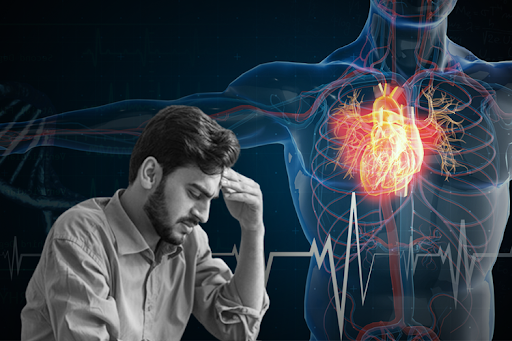Heart Health: Impact of Stress and Hypertension
Jan 12, 2024
The heart is an organ that works tirelessly to keep us alive, pumping blood throughout the body and supplying oxygen and nutrients to our organs. However, our heart health is constantly under threat from several risk factors, including stress and hypertension.

Heart health is a critical aspect of overall well-being, as the heart is a vital organ responsible for pumping blood throughout the body. Poor heart health can lead to a range of health issues, including high blood pressure, heart disease, and stroke. A healthy lifestyle that includes regular exercise, a balanced diet, and stress management is key to maintaining optimal heart health. Regular physical activity can help to strengthen the heart and lower blood pressure, while a diet rich in fruits, vegetables, whole grains, and lean proteins can help to reduce the risk of heart disease. Additionally, managing stress levels through techniques such as meditation or yoga can also benefit heart health by reducing inflammation in the body.
There are also several medical interventions that can be used to improve heart health, such as medication or surgery. For example, medications like statins can help to lower cholesterol levels, while surgical procedures like bypass surgery can help to restore blood flow to the heart. It is important to work closely with healthcare professionals to develop an individualized plan for managing heart health, based on factors such as age, family history, and lifestyle habits. By prioritizing heart health through healthy habits and medical interventions, individuals can reduce their risk of heart disease and enjoy a healthier, more active life.
Stress has become an inevitable part of modern life, with work, personal life, and financial pressures taking a toll on our mental and physical well-being. Chronic stress can have a detrimental impact on our heart health, increasing the risk of heart disease and heart attack. When we experience stress, the body releases stress hormones such as adrenaline and cortisol, which can raise blood pressure and cause inflammation in the body. Over time, these changes can damage the blood vessels, leading to hypertension and heart disease.
Hypertension, or high blood pressure, is a condition in which the force of blood against the artery walls is consistently high. This puts extra strain on the heart, making it work harder to pump blood throughout the body. Hypertension is a leading cause of heart disease and stroke, and it often has no symptoms until it reaches a dangerous level. Risk factors for hypertension include age, family history, obesity, smoking, and a sedentary lifestyle.
The effects of stress on the heart are well-documented, with studies showing that chronic stress can increase the risk of heart disease by up to 40%. Stress can also exacerbate existing heart conditions, leading to symptoms such as chest pain, palpitations, and shortness of breath. In addition, stress can lead to unhealthy coping mechanisms such as smoking, overeating, and alcohol abuse, which further increase the risk of heart disease.
One of the most severe effects of stress on the heart is the increased risk of heart attack. Stress can cause the heart to beat faster and harder, leading to a rupture of the plaque in the arteries and causing a blockage. This can cut off the blood supply to the heart, leading to a heart attack. Symptoms of a heart attack include chest pain, nausea, sweating, and shortness of breath, and it requires immediate medical attention.
To prevent the negative impact of stress on the heart, it is essential to manage stress effectively. This includes practicing relaxation techniques such as meditation, yoga, and deep breathing, getting regular exercise, maintaining a healthy diet, and getting enough sleep. In addition, it is essential to identify and address the sources of stress in our lives, such as work or relationship problems, and seek support from friends, family, or a mental health professional.
In addition to stress, hypertension is another significant risk factor for heart disease. Hypertension can damage the blood vessels and increase the risk of plaque buildup in the arteries, leading to heart attack, stroke, and other cardiovascular diseases. Hypertension can also damage the kidneys and eyes, leading to kidney failure and vision problems.
To manage hypertension, lifestyle changes such as maintaining a healthy diet, exercising regularly, reducing alcohol consumption, and quitting smoking can be effective. In addition, medication may be prescribed to lower blood pressure and reduce the risk of heart disease. Regular blood pressure monitoring is also essential to detect and manage hypertension early.
Para's Health is a leading provider of healthcare services, including cardiology, and is committed to promoting heart health. Para's Health offers a range of diagnostic tests and treatments for heart disease, including echocardiograms, stress tests, and angioplasty. In addition, Para's Health provides education and support for patients with heart disease, helping them to manage their condition effectively.
In conclusion, stress and hypertension are significant risk factors for heart disease and can have a detrimental impact on our heart health. To protect our hearts, it is essential to manage stress effectively, maintain a healthy lifestyle, and monitor blood pressure regularly by taking care of our heart.
Dr. Amit Bhsuhan Sharma
Director & Unit Head – Cardiology
Paras Health, Gurugram








